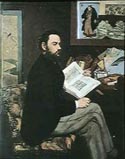
What is English?
English is the language by which most of us communicate and express ourselves. On a personal level, English allows us to convey what we think, feel, and want. In the larger picture, it allows us to conduct business, educate ourselves, and teach others. Globally, English is the native language of over 400,000,000 people, the largest language community except for Mandarin Chinese. It is spoken in nearly every country of the world and is the predominant language on two of the six inhabited continents. It is the second language of millions of Europeans and Asians and is the "official" language in more than a dozen countries. English is the closest thing to a world language that has ever existed!What Can You Do with a Degree in English?
English majors have become hot commodities!We live in an "Information Age," that commands frequent and immediate communication, through all forms of electronic media and personal interaction. EVERYTHING is affected by language ability. Our society views as essential effective writing and speaking in business, the media, and the culture. A famous scholar of culture once said, "The medium is the message;" this applies today perhaps more than ever before when we consider the sheer volume of written and verbal language that our culture produces. People who have an understanding and command of the text--in literary, cinematic, and technical forms--can contribute to every aspect of our society. No place is this more evident than in the Internet revolution sweeping our society. With the advent of the Internet, more companies now than ever before demand the skills that English majors develop. Developing pages and sites for the World Wide Web takes ingenuity, critcal analysis, careful thought, and expert writing skills. The English major successfully develops these characteristics as she proceeds through her program of study.
Many English majors become teachers, but . . .
Many people who major in English also have a degree in education and
plan to teach, but an English major is also excellent preparation for careers
in Internet publishing, the legal profession, business administration and
management, publishing, mass communication, journalism, advertising and
public relations. Careers in publishing and journalism include writing
and editing. English trains the student to analyze information, think critically,
and communicate well. Recently, a human relations executive at a world-wide,
Fortune 500, accounting and consulting firm told me that he and his firm
actively recruit English majors for their critical thinking and communication
skills. He asserted that his company could teach a person successful business
skills in four months at a training facility, but that his company could
never teach critical thinking and effective communication. He offered this
advice: the student who earns a degree in English, while enhancing her
undergraduate degree program to include courses to target other areas,
becomes extremely marketable in business employment.
English majors should think carefully about future employment before embarking on their course of study. Many students traditionally look upon an English major as the background for a career writing novels and stories. Although some realize this goal, many do not. The English major should be practical about her approach to education and carefully design a program of study that provides her with marketable skills. Above all, understand that our society needs the skills of English majors.
